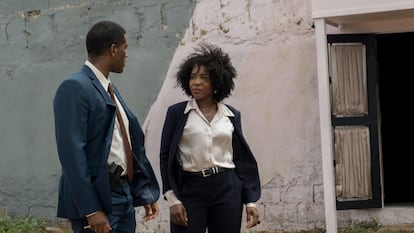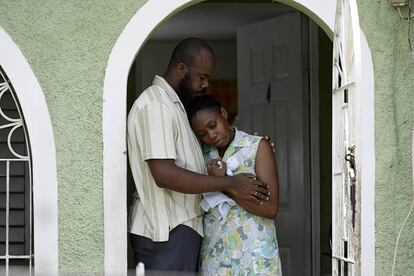‘Get Millie Black’, the first (and very powerful) Jamaican noir in history
Marlon James, winner of the Booker Prize for his stunning ‘A Brief History of Seven Killings,’ transitions to television and creates a Scotland Yard detective who returns home to confront her past and a fiercely turbulent Caribbean

Writer Marlon James was born in Kingston, the capital of Jamaica, in 1970. His parents worked for the police, and he was a diligent student. Upon graduating from university in 1991, he boarded a plane and left. He has explained on multiple occasions that he was fleeing homophobia and poverty — a lifelong precariousness that, he believed, would have stifled his potential, whether as a writer or in any other capacity. Today, James is a professor at a university in Minnesota, has published four novels, and one, a monumental, strange, noir masterpiece, won the Booker Prize in 2015. It is called A Brief History of Seven Killings.
Nothing has come easily, however. His first novel received about 70 rejection letters from publishers, who today likely wonder what they were thinking — or perhaps not, as the imbalance persists. This is evident in his groundbreaking first television series, Get Millie Black, the first-ever Jamaican noir, which makes a striking debut.
Forget everything you know about noir—or, in this case, hard-boiled crime fiction, that classic genre of private detectives caught between glamour and the underworld, forever defined by Raymond Chandler. Now, prepare to relocate. This is Kingston, and there are no luxury parking lots, not even parking spaces, for the car driven by Millie-Jean (played by a superb Tamara Lawrance), the former Scotland Yard detective who returns home — not to escape the dreary London weather, as much as she hated it, but to save someone who couldn’t be saved: her sister, a trans woman who endured the violence of life in the Canal, a forgotten, marginalized neighborhood. Here, there are only vacant lots, half-ruined houses, children playing in the streets, and then, mansions filled with white people. And as Millie puts it, “Behind every white family, there is the ghost of a slave.”
This is what must be reprogrammed before venturing into the abyss inhabited by Millie Black, the missing girl, Janet Fenton — only 16 years old, but already the object of desire for the son of a wealthy man — and Curtis, Millie’s patrol partner, a gay detective in a country where being gay is still a crime. How do you distinguish peace — or what could be called civilization — in a place where violence piles up in layers?
As George Orwell’s Animal Farm suggests, not all are treated equally, for there are citizens who are “more equal” than others. While Millie is outraged by the English detective who arrives searching for the son of the rich family interested in Janet — who, like her, is missing — her own sister suffers from an even greater lack of protection.

Because in Jamaica, the life of a trans woman not only matters less than that of a white man or a Black woman, but also appears to exist beneath the law — and society itself. She is utterly alone, having dared to follow a path deemed forbidden. Men organize raids to eradicate any deviation from the norm, often subjecting their victims to brutal beatings that sometimes result in death.
One of the standout qualities of Get Millie Black is its double-edged critique — one of the hallmarks of crime fiction — that shines a light on the true crimes that remain entirely hidden or absent from typical detective stories. And then there’s the game of clues — the homage to the detective genre, where the protagonist navigates thanks to clever ingenuity and small discoveries, like the classic matchbox, which increasingly rare in the genre today.
And yes, Kingston. Just as the latest, essential True Detective brought Alaska — and its eternal night — into the realm of crime fiction, Get Millie Black reveals its opposite: a Caribbean city where it is always hellishly hot. The sweaty, brutal capital of Jamaica, where the world feels a couple of decades — or three — removed from the present. And here, a woman — arriving from 21st-century London, a city, as she admits, “with its institutionalized racism” — comes to terms with the inevitable: the past that could have been nothing other than what it was, and a rabidly unjust present. Meanwhile, the voice of its creator, Marlon James, seems to rise up, each time, in defiance of everything he dislikes about what he left behind — and that still, ferociously, persists.
Sign up for our weekly newsletter to get more English-language news coverage from EL PAÍS USA Edition
Tu suscripción se está usando en otro dispositivo
¿Quieres añadir otro usuario a tu suscripción?
Si continúas leyendo en este dispositivo, no se podrá leer en el otro.
FlechaTu suscripción se está usando en otro dispositivo y solo puedes acceder a EL PAÍS desde un dispositivo a la vez.
Si quieres compartir tu cuenta, cambia tu suscripción a la modalidad Premium, así podrás añadir otro usuario. Cada uno accederá con su propia cuenta de email, lo que os permitirá personalizar vuestra experiencia en EL PAÍS.
¿Tienes una suscripción de empresa? Accede aquí para contratar más cuentas.
En el caso de no saber quién está usando tu cuenta, te recomendamos cambiar tu contraseña aquí.
Si decides continuar compartiendo tu cuenta, este mensaje se mostrará en tu dispositivo y en el de la otra persona que está usando tu cuenta de forma indefinida, afectando a tu experiencia de lectura. Puedes consultar aquí los términos y condiciones de la suscripción digital.









































